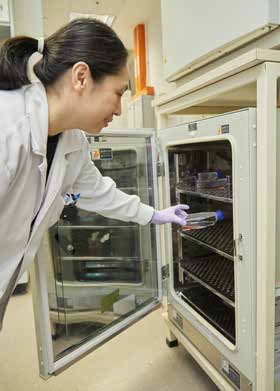A type of white blood cell,
gamma delta T-cells (GDTcells),
derived from cord
blood, may be able to
prevent or delay some cancer
relapses, early studies by a
team of Singapore General Hospital (SGH)
researchers have shown. The team also found
that a platform they developed was able to
generate these cells on a large scale.
The team is looking to put their findings
to further test in a phase 1 clinical trial for
leukaemia and lymphoma treatments. “We
are working closely with the Advanced
Cell Therapy and Research Institute (the
national cell therapy facility, ACTRIS) to
validate and finalise Good Manufacturing
Practices workflows,” said Dr Alice Cheung,
Junior Principal Investigator, Department
of Haematology, SGH, and senior author
of the study. The findings of the study were
published in a peer-reviewed journal, Science
Advances, in June 2023, she added.

T-cells are a type of white blood cells that
help the body’s immune system fight germs
and protect it from disease. GDT-cells, a subtype
T-cell useful in cancer immunotherapy,
have antiviral and antitumour properties that
allow them to keep a look out for signs of
biological stress, like cancerous or infected
cells in the body, and are one of the first lines
of defence against disease. GDT-cells can
be found in the blood of an adult. However,
umbilical cord blood has greater enrichment
of specific, more cytotoxic, subsets of GDT-cells,
said Dr Cheung.
“Most initial efforts have been focused
on exploring the use of GDT-cells in
adults as cancer treatment. Unfortunately,
response rates in early clinical trials were
generally low and treatment efficacies were
sub-optimal. This was why we decided to
turn our attention to umbilical cord blood
instead,” said Dr Cheung.
The team from the Haematology and
Molecular Pathology departments used more
than 20 clinical grade umbilical cord blood
samples from the Singapore Cord Blood
Bank to produce and validate the GDT-cells
on the platform, she said.
According to Associate Professor GohYeow Tee, Senior Consultant, Departmentof Haematology, SGH, “Umbilical cord
blood-derived GDT-cells are akin to young
warriors, potentially having longer-lasting
effects and being more adaptable to take
on additional functions.” However, Assoc
Prof Goh, also an author of the study, noted that the cord blood cells “are currently
under-utilised, with the main concern that
there may not be enough of these T-cells
for clinical application, but our study has
shown that it is potentially feasible”.
The study found that the
cord blood GDT-cells that were
manufactured on the platform
were “potent cancer killers that
were able to target a variety of
solid and liquid cancers”, said
Dr Cheung. “These cell products
are highly versatile, and can be
combined with different existing
cancer drugs such as small molecule
drugs and antibodies to induce much
higher cancer cell kill,” she added.
The platform, which uses the team’s
proprietary technology, is able to produce
massive amounts of various cancertargeting
GDT-cells quickly — in under
two weeks. The cell products can then
be frozen for storage, and thawed when
needed for cancer treatment. “Such cost-efficient
production of off-the-shelf cancer
immunotherapeutic cell products has the
potential to deliver effective and affordable
cancer treatment to patients in a timely
manner,” added Dr Cheung.
Get the latest updates about Singapore Health in your mailbox! Click here to subscribe.
